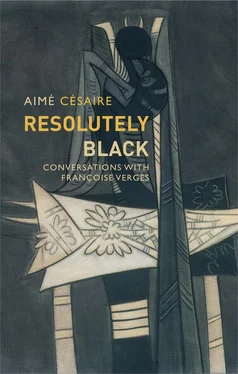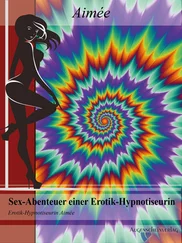The city shut down at noon, its streets empty and quiet. In La Savane, a large park along the wharf, we saw the headless, paint-smeared statue of Empress Josephine. The French officials had given up on replacing the head, since each time they tried to fix it, the next night it would go missing again. Lining the park’s western edge, on Rue de la Liberté, we strolled past the faded glory of the Bibliothèque Schoelcher, the Musée d’Archéologie Précolombienne et Préhistoire de la Martinique and the Pavillon Bougenot, built in the colonial style. Césaire was very proud of his city, especially the neighborhoods he had modernized by bringing in water and electricity and creating a sewage system. Every Thursday afternoon his driver would take him for a ride through the mountains and along the coast. He invited me to join him. He came with his driver to pick me up and brought with him two books: one on the island’s flora so that he could name the flowers and plants we’d see; the other a work of philosophy since I had asked him about his influences when he was younger. He had the driver stop on several occasions for me to admire a particular view, plant, or tree. He’d tell me the names of the various communes and explain the ties their elected officials had with his party, the Parti Progressiste Martiniquais (PPM). We drove up Mount Pelée, which was draped in fog. He expressed his admiration for this place. People would recognize him and greet him with respect from afar. Césaire didn’t come across as someone who would provoke a casual attitude in you. With a distinguished elegance of times past, he wore a suit and tie every day, and no one would dare think you’d ever catch him in a T-shirt and shorts. We drove back down toward the city of Saint-Pierre where he showed me around. The destruction of this city in a matter of minutes on May 8, 1902 from a volcanic eruption at Mount Pelée remains a significant date for Martinique. Historians speak of a death toll of 28,000 – people suffocated, charred, burned alive – a city covered in ash, a boiling sea where those fleeing the lava sought refuge only to drown, an unbearable heat and stench the following days, corpses in the streets and along the port, buildings in ruins. The city known as the “Paris of the Caribbean” for its theaters, its cultural and social life, became a ghost city in no more than a few minutes. This catastrophe robbed the city of its splendor and prestige, which it would never regain. Today it’s a small village that forfeited its status as the capital to Fort-de-France after its destruction. Césaire showed me what remained of the theater, then asked his driver to turn down Fonds-Saint-Denis where a kapok tree stood spreading its majestic branches at the juncture of two roads. Its charred trunk was a reminder of its having been a victim of the 1902 volcanic eruption. But, 50 years later, buds appeared and it started to blossom and grow. Césaire often came to admire this tree, which, more than a century old, didn’t just survive a catastrophe but, with its new growth, proved nature’s indifference to catastrophes. These are the places he liked to visit, letting his mind wander, jotting down lines of poetry, lost in contemplation.
Every morning, between nine and noon, we’d sit down for our interview. He’d tire quickly, due in part to his age but also to the long life he had lived. He had said and written so much, what was there left to explain, justify, defend, argue? “My poetry speaks for me,” he said on more than one occasion. But I wanted to talk about his political work, his less “visible” activity, which hadn’t received as much attention: his analysis of French colonialism. Although rather surprised by this interest initially, he indulged me and also asked me many questions about Africa. After learning that I went there often, that I knew South Africa quite well, he wanted me to talk more about it. Our conversations were unstructured, at times bewilderingly so. They carried on for a few days but then it became clear it was time to leave. I understood that Césaire had told me everything he had wanted to tell me.
There are many reasons I had wanted to interview him. First of all, I wanted to remind people of the role Césaire played for the generation of women and men responsible for dismantling colonialism, a role I judged too soon forgotten. He was also, as I said, someone I had heard about throughout my childhood. He knew my grandfather, Raymond Vergès, very well, the two of them having worked together to transform the colonies of Martinique, Guadeloupe, Réunion and Guiana into French departments. Then his work as a deputy of Martinique and leader of the Parti Progressiste Martiniquais made him a familiar name around the house and at political gatherings. He was close with other politicians from Réunion and his party collaborated with leftist parties from the overseas departments on initiatives to democratize the political, social, and cultural life of these territories. I was very familiar with two of his texts: Journal of a Homecoming and Discourse on Colonialism , which I deemed essential reading for understanding decolonization. In short, Césaire was a well-known figure whom I held in great esteem and for whom I had the utmost respect. Once I began talking about my idea to interview Césaire, many people in France, however, claimed to be unfamiliar with his writing and his work. Or they simply thought he had died. I wasn’t too surprised. This was symptomatic of France’s opinion of the overseas departments, whose culture and history remained poorly understood, evoked only in passing with offhand and vague comments. I wished to interview him because I was struck by his relevance for our contemporary moment, which went against popular opinion with its fixation on Frantz Fanon, Patrick Chamoiseau or Édouard Glissant, all important writers who should be appreciated without eclipsing Césaire. In Césaire’s work, being black is a historical phenomenon, one tied directly to Africa and the diaspora of its people. It isn’t a trait, but a perceived difference that adds another dimension to one’s experience, which, though neither better nor worse than that of others, can’t ignore the genealogy of forced slavery, of deportation, of life on the plantation and the birth of new societies whose memory of these events is still very much with us.
As the history of slavery and the slave trade finally emerged as topics of public debate, the time seemed right to return to the texts and speeches of a man who had devoted so much of his thinking to these matters, a man who received a French public school education but on an island that was still colonized by former slaveholders, a man who was later a student in Paris at the École Normale Supérieure, that temple of the French elite. His biography of Toussaint Louverture, his plays, his speeches, and the place Haiti occupies in his work speak to the importance of this history in his writing. 8Césaire brought a fresh perspective to debates on the slave trade and slavery, calling attention to the profoundly brutal and inhumane nature of these practices and deeming their consequences irreparable. In this respect, he stood out from others who were calling for reparations, which he feared could turn an event with innumerable consequences into a tidy sum. Césaire’s writing on colonialism also became increasingly relevant in light of other developments in France, such as the law passed in 2005 that required schools to address the benefits of colonization, or the emergence of “Indigènes de la République,” 9or the reexamination of France’s past by a growing body of works and documentaries.
I didn’t want to encourage a nostalgic reading of Césaire. Rather, I sought to bring renewed attention to a voice that bore witness to a century, to the fall of colonial empires and to the questions raised by their collapse, to the writing of the history of the “voiceless,” to the vanished of the non-European world.
Читать дальше












